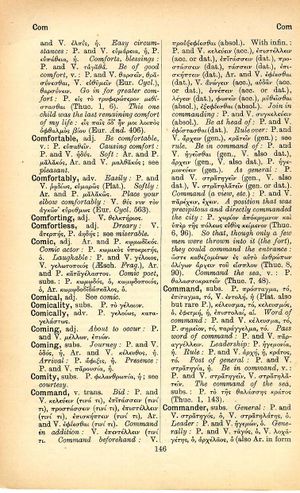command: Difference between revisions
ἐπεὰν νῶτον ὑὸς δελεάσῃ περὶ ἄγκιστρον, μετιεῖ ἐς μέσον τὸν ποταμόν, ὁ κροκόδειλος ἵεται κατὰ τὴν φωνήν, ἐντυχὼν δὲ τῷ νώτῳ καταπίνει → when he has baited a hog's back onto a hook, he throws it into the middle of the river, ... the crocodile lunges toward the voice of a squealing piglet, and having come upon the hogback, swallows it
mNo edit summary |
m (Woodhouse1 replacement) |
||
| Line 1: | Line 1: | ||
{{Woodhouse1 | {{Woodhouse1 | ||
|Text=[[File:woodhouse_146.jpg|thumb|link={{filepath:woodhouse_146.jpg}}]] | |Text=[[File:woodhouse_146.jpg|thumb|link={{filepath:woodhouse_146.jpg}}]] | ||
===verb transitive=== | |||
[[bid]]: [[prose|P.]] and [[verse|V.]] [[κελεύειν]] ([[τινά]] τι), [[ἐπιτάσσειν]] ([[τινί]] τι), [[προστάσσειν]] ([[τινί]] τι), [[ἐπιστέλλειν]] ([[τινί]] τι), [[ἐπισκήπτειν]] ([[τινί]] τι), [[Aristophanes|Ar.]] and [[verse|V.]] [[ἐφίεσθαι]] ([[τινί]] τι). | |||
[[command in addition]]: [[verse|V.]] [[ἐπεντέλλειν]] ([[τινί]] τι). | |||
[[command beforehand]]: [[verse|V.]] [[προὐξεφίεσθαι]] (absol.). | |||
[[with]] infin.: [[prose|P.]] and [[verse|V.]] [[κελεύειν]] (acc.), [[ἐπιστέλλειν]] (acc. or dat.), [[ἐπιτάσσειν]] (dat.), [[προστάσσειν]] (dat.), [[τάσσειν]] (dat.), [[ἐπισκήπτειν]] (dat.), [[Aristophanes|Ar.]] and [[verse|V.]] [[ἐφίεσθαι]] (dat.), [[verse|V.]] [[ἀνώγειν]] (acc.), [[αὐδᾶν]] (acc. or dat.), [[ἐννέπειν]] (acc. or dat.), [[λέγω]], [[λέγειν]] (dat.), [[φωνεῖν]] (acc.), [[μυθεῖσθαι]] (absol.), [[ἐξεφίεσθαι]] (absol.). | |||
[[join in commanding]]: [[prose|P.]] and [[verse|V.]] [[συγκελεύειν]] (absol.). | |||
[[be at head of]]: [[prose|P.]] and [[verse|V.]] [[ἐφίστασθαι]] (dat.). | |||
[[rule over]]: [[prose|P.]] and [[verse|V.]] [[ἄρχειν]] (gen.), [[κρατεῖν]] (gen.); see [[rule]]. | |||
[[be in command of]]: [[prose|P.]] and [[verse|V.]] [[ἡγεῖσθαι]] (gen., [[verse|V.]] also dat.), [[ἄρχειν]] (gen., [[verse|V.]] also dat.), [[prose|P.]] [[ἡγεμονεύειν]] (gen.). | |||
[[as general]]: [[prose|P.]] and [[verse|V.]] [[στρατηγεῖν]] (gen., [[verse|V.]] also dat.), [[verse|V.]] [[στρατηλατεῖν]] (gen. or dat.). | |||
[[command]] (a [[view]], etc.): [[prose|P.]] and [[verse|V.]] [[παρέχω]], [[παρέχειν]], [[ἔχειν]]. | |||
[[a position that was precipitous and directly commanded the city]]: [[prose|P.]] [[χωρίον ἀπόκρημνον καὶ ὑπὲρ τῆς πόλεως εὐθύς κείμενον]] ([[Thucydides|Thuc.]] 6, 96). | |||
so that, though only a few men were thrown into it (the fort), they could command the entrance: ὥστε καθεζομένων ἐς αὐτὸ ἀνθρώπων ὀλίγων ἄρχειν τοῦ εἴσπλου ([[Thucydides|Thuc.]] 8, 90). | |||
[[command the sea]], v.: [[prose|P.]] [[θαλασσοκρατεῖν]] ([[Thucydides|Thuc.]] 7, 48). | |||
===substantive=== | |||
P. [[πρόσταγμα]], τό, [[ἐπίταγμα]], τό, V. [[ἐντολή]], ἡ ( | [[prose|P.]] [[πρόσταγμα]], τό, [[ἐπίταγμα]], τό, [[verse|V.]] [[ἐντολή]], ἡ ([[Plato]] also but rare [[prose|P.]]), [[κέλευσμα]], τό, [[κελευσμός]], ὁ, [[ἐφετμή]], ἡ, [[ἐπιστολαί]], αἱ. | ||
[[word of command]]: [[prose|P.]] and [[verse|V.]] [[κέλευσμα]], τό, [[prose|P.]] [[σημεῖον]], τό, [[παράγγελμα]], τό. | |||
[[pass word of command]]: [[prose|P.]] and [[verse|V.]] [[παραγγέλλειν]]. | |||
[[leadership]]: [[prose|P.]] [[ἡγεμονία]], ἡ. | |||
[[rule]]: [[prose|P.]] and [[verse|V.]] [[ἀρχή]], ἡ, [[κράτος]], τό. | |||
[[post of general]]: [[prose|P.]] and [[verse|V.]] [[στρατηγία]], ἡ. | |||
[[be in command]], v.; [[prose|P.]] and [[verse|V.]] [[στρατηγεῖν]], [[verse|V.]] [[στρατηλατεῖν]]. | |||
[[the command of the sea]], subs.: [[prose|P.]] [[τὸ τῆς θαλάσσης κράτος]] ([[Thucydides|Thuc.]] 1, 143). | |||
}} | }} | ||
Revision as of 08:45, 20 May 2020
English > Greek (Woodhouse)
verb transitive
bid: P. and V. κελεύειν (τινά τι), ἐπιτάσσειν (τινί τι), προστάσσειν (τινί τι), ἐπιστέλλειν (τινί τι), ἐπισκήπτειν (τινί τι), Ar. and V. ἐφίεσθαι (τινί τι).
command in addition: V. ἐπεντέλλειν (τινί τι).
command beforehand: V. προὐξεφίεσθαι (absol.).
with infin.: P. and V. κελεύειν (acc.), ἐπιστέλλειν (acc. or dat.), ἐπιτάσσειν (dat.), προστάσσειν (dat.), τάσσειν (dat.), ἐπισκήπτειν (dat.), Ar. and V. ἐφίεσθαι (dat.), V. ἀνώγειν (acc.), αὐδᾶν (acc. or dat.), ἐννέπειν (acc. or dat.), λέγω, λέγειν (dat.), φωνεῖν (acc.), μυθεῖσθαι (absol.), ἐξεφίεσθαι (absol.).
join in commanding: P. and V. συγκελεύειν (absol.).
be at head of: P. and V. ἐφίστασθαι (dat.).
rule over: P. and V. ἄρχειν (gen.), κρατεῖν (gen.); see rule.
be in command of: P. and V. ἡγεῖσθαι (gen., V. also dat.), ἄρχειν (gen., V. also dat.), P. ἡγεμονεύειν (gen.).
as general: P. and V. στρατηγεῖν (gen., V. also dat.), V. στρατηλατεῖν (gen. or dat.).
command (a view, etc.): P. and V. παρέχω, παρέχειν, ἔχειν.
a position that was precipitous and directly commanded the city: P. χωρίον ἀπόκρημνον καὶ ὑπὲρ τῆς πόλεως εὐθύς κείμενον (Thuc. 6, 96).
so that, though only a few men were thrown into it (the fort), they could command the entrance: ὥστε καθεζομένων ἐς αὐτὸ ἀνθρώπων ὀλίγων ἄρχειν τοῦ εἴσπλου (Thuc. 8, 90).
command the sea, v.: P. θαλασσοκρατεῖν (Thuc. 7, 48).
substantive
P. πρόσταγμα, τό, ἐπίταγμα, τό, V. ἐντολή, ἡ (Plato also but rare P.), κέλευσμα, τό, κελευσμός, ὁ, ἐφετμή, ἡ, ἐπιστολαί, αἱ.
word of command: P. and V. κέλευσμα, τό, P. σημεῖον, τό, παράγγελμα, τό.
pass word of command: P. and V. παραγγέλλειν.
leadership: P. ἡγεμονία, ἡ.
rule: P. and V. ἀρχή, ἡ, κράτος, τό.
post of general: P. and V. στρατηγία, ἡ.
be in command, v.; P. and V. στρατηγεῖν, V. στρατηλατεῖν.
the command of the sea, subs.: P. τὸ τῆς θαλάσσης κράτος (Thuc. 1, 143).

